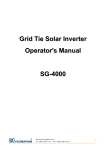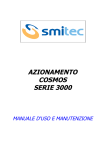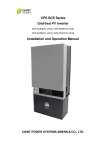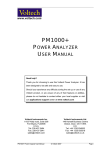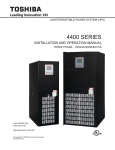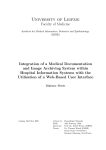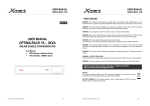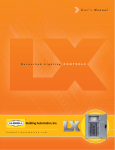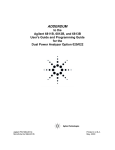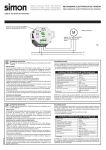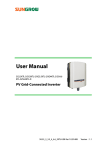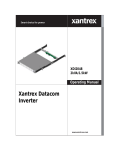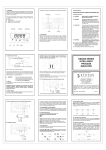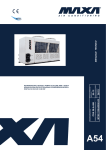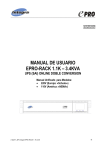Download 1800 Series
Transcript
UNINTERRUPTIBLE POWER SYSTEMS 1800 Series User Manual 1800 Series Uninterruptible Power Systems (UPS) 6! © Copyright 2007 Toshiba International Corporation All rights reserved. Product Use and Warranty Restrictions The Toshiba products listed in this document are intended for usage in general electronics applications (computer, personal equipment, office equipment, measuring equipment, industrial robotics, domestic appliances, etc.). These Toshiba products are neither intended nor warranted for usage in equipment that either requires extraordinarily high quality and/or reliability, or a malfunction or failure of which may cause loss of human life or bodily injury (“Unintended Usage”). Unintended Usage include atomic energy control instruments, airplane or spaceship instruments, transportation instruments, traffic signal instruments, combustion control instruments, medical instruments, all types of safety devices, etc. Unintended Usage of Toshiba products listed in this document shall be made at the customer’s own risk. NOTICE PLEASE INFORM TOSHIBA INTERNATIONAL CORPORATION OR AUTHORIZED REPRESENTATIVE IN CASE OF INCONSISTENCIES, OMISSIONS, OR QUESTIONS. The instructions contained in this manual are not intended to cover all of the details or variations in equipment, or to provide for every possible contingency concerning installation, operation, or maintenance. Should further information be required or if problems arise which are not covered sufficiently contact your Toshiba sales office. The contents of this instruction manual shall not become a part of or modify any prior or existing agreement, commitment, or relationship. The sales contract contains the entire obligation of Toshiba International Corporation’s Uninterruptible Supply Systems Division. The warranty contained in the contract between the parties is the sole warranty of Toshiba International Corporation’s UPS Division and any statements contained herein DO NOT create new warranties or modify the existing warranty. Any electrical or mechanical modifications to this equipment without prior written consent of Toshiba International Corporation will void all warranties and may void the UL/CUL listing. Unauthorized modifications can also result in personal injury, death, or destruction of the equipment. 1800 Series User Manual QUALIFIED PERSONNEL ONLY Qualified Personnel are those who have the skills and knowledge relating to the construction, installation, operation, and maintenance of the electrical equipment and have received safety training on the hazards involved (Refer to the latest edition of NFPA 70E for additional safety requirements). UNINTERRUPTIBLE POWER SYSTEM (UPS) Please complete the following information and retain for your records. Unless otherwise specified, the warranty period for the UPS or UPS part is 36 months from the shipment date (see Toshiba International Corporation Bill of Lading for shipping date). Unless otherwise specified, the warranty period for a UPS battery is 24 months from the shipment date (see Toshiba International Corporation Bill of Lading for shipping date). JOB NUMBER MODEL NUMBER SERIAL NUMBER APPLICATION SHIPMENT DATE INSTALLATION DATE INSPECTED BY FEB 2007 58619-000 1800 Series User Manual Toshiba’s Customer Support Center Contact the Toshiba Customer Support Center for assistance with application information or for any problems that you may experience with your Uninterruptible Power System (UPS). Toshiba Customer Support Center 8 a.m. to 5 p.m. (CST) - Monday through Friday Email - [email protected] Tel 713/466-0277 Fax 713/896-5212 USA Toll Free 800/231-1412 Canada 800/872-2192 Mexico 01/800/527-1204 You may also contact Toshiba by writing to: Toshiba International Corporation 13131 West Little York Road Houston, Texas 77041-9990 Attn: UPS Product Manager For further information on Toshiba’s products and services, please visit our website at: www.toshiba.com/ind/ © Copyright 2007 Toshiba International Corporation All rights reserved. Printed in the U.S.A. 1800 Series User Manual TABLE OF CONTENTS Product Use and Warranty Restrictions............................................3 General Safety Instructions................................................................8 Important Safety Instructions.............................................................9 INSTRUCTIONS IMPORTANTES CONCERNANT LA SÉCURITÉ.....10 Product Description............................................................................11 Inspection/Installation.........................................................................13 Inspection of the New UPS Equipment..............................................13 Unpacking Instructions.......................................................................13 After Unpacking..................................................................................13 Installation Precautions......................................................................13 Operating Precautions......................................................................14 Layout................................................................................................15 External Dimensions..........................................................................16 Wiring the Unit . .................................................................................16 UPS Power Connections....................................................................16 Operating the UPS...............................................................................19 Display Panel Layout.........................................................................19 Starting the UPS System...................................................................20 Starting When AC Power is Available.................................................20 Starting on DC Power........................................................................20 Stopping the UPS...............................................................................21 Battery Backup Time..........................................................................24 Battery Recharge Time......................................................................24 Battery Check Function......................................................................25 The Function Control Button..............................................................25 Communication Interface...................................................................26 Remote Contacts (IBM AS/400).........................................................26 RS-232C............................................................................................27 Option Card Slot.................................................................................28 Troubleshooting..................................................................................28 Warning/Fault Modes.........................................................................28 Storage of UPS Equipment.................................................................35 General Guidelines............................................................................35 Disposal.............................................................................................36 1800 Series User Manual Preventive and Scheduled Maintenance/Parts Replacement.........37 Preventive Maintenance.....................................................................37 Parts Replacement.............................................................................37 Appendix A: Specifications...............................................................38 Appendix B: System Overload..........................................................40 Appendix C: Parallel Operation........................................................41 Appendix D: Bypass Undervoltage / Overvoltage...........................42 Appendix E: 1800 Model/Wire Size specifications..........................43 Limited Warranty Policy . ...................................................................44 1800 Series User Manual General Safety Instructions Warnings in this manual appear in two different ways: Danger Warnings Danger Caution Warnings Caution The danger warning symbol is an exclamation mark enclosed in a triangle that precedes the large bold letters spelling the word “DANGER”. The Danger warning symbol is used to indicate situations, locations, and conditions that exist and can cause serious injury or death. The caution warning symbol is an exclamation mark enclosed in a triangle that precedes the large bold letters spelling the word “CAUTION”. The Caution warning symbol is used to indicate situations and conditions that can cause operator injury and/or equipment damage. Other warning symbols may appear along with the Danger and Caution symbol and are used to specify special hazards. These warnings describe particular areas where special care and/or procedures are required in order to prevent serious injury and possible death: Electrical Warnings The electrical warning symbol is a lightning bolt mark enclosed in a triangle. The electrical warning symbol is used to indicate high voltage locations and conditions that may cause serious injury or death if the proper precautions are not observed. Explosion Warnings The explosion warning symbol is an explosion mark enclosed in a triangle. The explosion warning symbol is used to indicate locations and conditions where molten, exploding parts may cause serious injury or death if the proper precautions are not observed. 1800 Series User Manual Important Safety Instructions SAVE THESE INSTRUCTIONS. This manual contains important instructions for all models of the Toshiba 1800 Series UPS. These instructions should be followed during the installation and maintenance of the UPS and its batteries. • The maximum ambient temperature in which this UPS unit should be operated or stored is 104°F (40°C). The maximum ambient temperature in which this UPS should charge batteries is 95°F (35°C). • When changing battery packs, be sure to use the proper model unit. Danger Caution Caution Caution Caution 1800 Series User Manual Do not dispose of the batteries in a fire. The batteries inside may explode. Misuse of this equipment could result in human injury and equipment damage. In no event will Toshiba International Corporation be responsible or liable for either indirect or consequential damage or injury that may result from the use of this equipment. Do not open or mutilate the batteries. Released electrolyte is harmful to the eyes and skin, and could be toxic. This unit contains sealed lead acid batteries. Lack of preventative maintenance could result in batteries exploding and emitting gasses and/or flame. Annual preventative maintenance must be performed by an authorized, trained technician. Failure to replace the batteries in accordance with the maintenance schedule may cause the batteries to crack, possibly releasing electrolytes from the battery, and resulting in secondary faults such as odor, smoke and fire. INSTRUCTIONS IMPORTANTES CONCERNANT LA SÉCURITÉ CONSERVER CES INSTRUCTIONS. Cette notice contient des instructions importantes concernant la sécurit. 10 Attention Une batterie peut présenter un risque de choc électrique, de brûlure par transfert d’énergie. Attention Pour le remplacement, utiliser le même nombre de batteries du modèle suivant. Attention L’élimination des batteries est réglementée. Consulter les codes locaux à cet effet. 1800 Series User Manual Product Description Theory of Operation An uninterruptible power supply, or system, is a device that is installed between commercial power and load equipment. The UPS provides steady AC power to the load during commercial power fluctuations and interruptions. During normal operation the UPS uses commercial AC power. It also takes in all of the high voltage spikes and transients caused by switching and faults, and all of the common mode and normal mode noise which is associated with commercial AC power. The UPS converts this input to flat DC power. From this DC power, the UPS generates its own extremely high quality AC output. The result of this process is maximum power conditioning. If the AC power supplied to the UPS drops below a specified voltage level, the unit’s batteries automatically begin supplying the power instead of receiving it. This insures that the load connected to the UPS continues to receive power without interruption. When commercial AC input power becomes available again, operation returns to normal. The unit’s batteries begin to recharge so they will be ready for the next power interruption. Application and Use Toshiba’s 1800 Series of on-line Uninterruptible Power Systems (UPS) provides continuous computer-grade AC power in a compact, high performance, energy efficient unit. The UPS assures safe and reliable operation of critical office equipment, minicomputers, and local area networks. All units feature an audible alarm which sounds if the battery voltage drops below standard during use. This is an additional aid to help in retaining the valuable office data banks. All units allow for computer interfacing for remote control and monitoring, and an external battery pack option for extended backup operation. (See Specifications) Power Backup During an electrical power failure the batteries of the UPS unit supply DC power to the inverter that supports the load equipment automatically, without interruption. For example, when used to support a computer, a UPS backup assures additional time to complete your activity and save data after a power failure occurs. 1800 Series User Manual 11 Power Conditioning While commercial power is present, the UPS supplies conditioned power to the load while maintaining the batteries in a charged condition. The UPS protects the connected load against the normal everyday problems associated with heavy use of raw commercial power, including power sags, signal interference, and spikes. This protection keeps power-line problems from reaching your load where it can cause equipment to operate erratically, or damage software or hardware. 12 1800 Series User Manual Inspection/Installation Inspection of the New UPS Equipment Upon receipt of the UPS, a careful inspection for shipping damage should be made. Unpacking Instructions 1. Remove box and foam pack. 2. Unbolt mounting rails from both pallet and unit. 3. Place mounting rails at front of pallet as shown. 4. Insert bolts removed from pallet into holes at top of ramp. 5. Place tie bracket in slots near base of ramp. After Unpacking 1) Check the unit for loose, broken, bent or otherwise damaged parts. If damage has occurred during shipment, keep all original packing materials for return to shipping agent. Warranty will not apply to units damaged during shipment. 2) Check to see that the rated capacity and the model number specified on the nameplate conform to the order specifications. Installation Precautions Caution 1800 Series User Manual 13 1) Install the unit in a well ventilated location; allow at least 4 inches (10 cm) on all sides and 8 inches (20 cm) on back for air ventilation and for maintenance. 2) Install the unit in a stable, level, and upright position that is free of vibration. 3) Install the unit where the ambient temperature is between 32° and 104°F (0° and 40°C). 4) Do not install the UPS in areas that are subject to high humidity. 5) Do not install the UPS in a location that will cause direct sunlight to shine on the unit. 6) Do not install the UPS in areas that are subject to contamination such as high levels of airborne dust, metal particles, or flammable gas. 7) Avoid installation near sources of electrical noise. Always make sure that the unit earth ground is intact to prevent electrical shock and to help reduce electrical noise. 8) Do not install where water or any foreign object may get inside the UPS. 9) This UPS generates and can radiate radio-frequency energy during operation. Although RFI noise filters are installed inside the unit there is no guarantee that the UPS will not influence some sensitive devices which are operating close by. If such interference is experienced, the UPS should be installed farther away from the affected equipment and/or powered from a different source than that of the affected equipment. Operating Precautions Caution 1) The UPS should not be powered up until this entire manual has been reviewed. 2) The input power source voltage and frequency must be within the allowable range specified in Appendix A. Voltages and frequencies outside of 14 1800 Series User Manual the specified tolerance range may cause internal protection devices to activate. 3) The UPS should not be used with a load whose rated input is greater than the rated UPS output. 4) Do not use the UPS to provide power to motors that require high starting current or that require a long starting time such as vacuum cleaners and machine tools (unless appropriate sizing is done by a Toshiba applications engineer, or other qualified personnel). 5) Do not insert metal objects or combustible materials in the unit’s ventilation slots. 6) Do not place, hang, or paste any objects on the top or on the exterior surfaces of the UPS. Layout Display Run/Stop Switch 0: Stop 1: Run Option Card Slot (SNMP/Web Remote Card) Cooling Fans Breaker Remote Contact (male) RS-232C (female) Air Vents Line cord and Receptacle Options panel 1800 Series User Manual Battery Plug (48V DC Input Receptacle for extended run times - contact TIC Marketing) 15 External Dimensions 9.9 in. 28.3 in. Max 23.3 in. Wiring the Unit Select the wire size appropriate for the 1800 model being installed. (See Appendix E, 1800 Model/Wire Size Specifications.) All wiring is to be tightened to 13 lb-in(1.5 N•m) of torque UPS Power Connections System Protection Features - The schematic shown below depicts the electrical locations of the protection devices of the UG1G2L024C6TB typeform UPS. Input Abnormal Overcurrent Breaker Bypass Reactor/ Charger/ Chopper Input ISOLATION OUTPUT XFMR Output Inverter Batteries Low Battery Level 16 Overheating Output Current Limit Overload Overvoltage/ Undervoltage Power Flow 1800 Series User Manual Power Connections - 120 V Input This illustrates the wiring connections from the power distribution panel (not part of the UPS) to the UPS terminal block for the 120 V input models of the 1800 Series UPS. UPS Output Voltage Main UPS Unit Output Voltage 120 V Source Power Distribution Panel H3-N 120 VAC L1 1 H1 L2 2 H2 Breaker Terminal H3 N G 3 G Terminal Block Details This is a detailed view of the UPS terminal block for 120V Input referenced in the connection diagrams above. 1 2 3 4 5 6 H1 H2 G H3 N G 120V GND 1800 Series User Manual 120V 7 8 GND 17 Power Connections - 208/240 V Input This illustrates the wiring connections from the power distribution panel (not part of the UPS) to the UPS terminal block for the 208/240 V input model of the 1800 Series UPS. UPS Output Voltage Main UPS Unit 208/240 V Source Power Distribution Panel 11 Input voltage section (factory 12 High (240V) setting: Low) 13 Breaker H3 L1 1 H2 H2A L2 2 H1 H1A N G 3 Output Voltage Low (208V) G Terminal H1A - H3 240 VAC 4 5 208 VAC H1A - H2A 120 VAC H1A-N, H3-N 7 6 8 Terminal Block Details This is a detailed view of the UPS terminal block for 208/240 V input referenced in the connection diagrams above. 1 2 3 4 5 6 7 8 11 12 13 H2 H1 G H3 H2A N H1A G LOW COM HIGH Ground 208/240 VAC Input cables from distribution panel 240V Ground 208V 120V 120V 208V 14 15 240V Jumper selection see Note 1 & 2 AC Output cables to loads Note 1: 208V Input: If AC input power is 208 V rated, terminals 11 and 12 must be shorted by a jumper wire. DO NOT jumper terminal 13 to either 11 or 12. Note 2: 240V Input: If AC input power is 240 V rated, terminals 12 and 13 must be shorted by a jumper wire. DO NOT jumper terminal 11 to either 12 or 13. 18 1800 Series User Manual Operating the UPS Display Panel Layout Function Control Button Startup on Battery Button ON LINE (green lamp) Lights green when the UPS’s inverter is supplying power to the load. AC INPUT (green lamp) Lights green when normal AC input power is being supplied to the UPS unit. WARNING/FAULT (red lamp) Lights red when the UPS is experiencing an abnormal condition. BATTERY (red lamp) Lights red to indicate that an abnormal condition exists that is affecting the batteries. 1800 Series User Manual 19 Starting the UPS System There are two ways to start the UPS system: from AC input power (if present) or from batteries. Ensure the input breaker is switched on (Figure, page 15). If the “AC Input” LED is lit, proceed to “Starting when AC Power is Available”. If the LED is not lit, then there is no AC power available. If the unit is to be started when AC power is not available proceed to “Starting on DC Power.” Starting When AC Power is Available Switch the RUN/STOP switch to the RUN position (RUN = I, STOP = 0). When the RUN/STOP switch is in the RUN position both the “AC Input” and the “On Line” LEDs should be lit. When the unit is started with AC input power it is advisable to allow time for the batteries to fully charge before any load is connected (see “Battery Recharge Time”, page 24). Starting on DC Power If no AC power source is available, or if the AC input power is outside of the allowable range for input voltage or frequency, the UPS can be started from battery power. The length of UPS operation time on battery power depends on the condition of the batteries and the amount of load the UPS is supporting. To start the UPS from battery power follow these steps: Step 1 Make sure the RUN/STOP switch is in the STOP position. If the UPS is being started on DC power because the AC power is out of range, the input breaker must be in the OFF position (Figure, page 15). Step 2 Press the “Startup on Battery” button. The UPS will beep indicating that AC power is not available and the Startup on Battery mode has been activated. Step 3 Switch the RUN/STOP switch to the RUN position. This must be done within 5 seconds of the Startup on Battery mode activation for the unit to startup using batteries. Once the unit has started, the “On Line” LED will light, indicating that the inverter is running and power is available at the output. If the RUN/STOP switch is not switched to the RUN position within those 5 seconds, the unit will return to shutdown mode. 20 1800 Series User Manual Stopping the UPS There are two ways to turn off the UPS: switching from online to bypass mode, or completely shutting down. Option 1 The first option is to place the UPS into bypass mode. Bypass mode means that if there is AC power available, the UPS will route power directly from the input source to the connected loads without any conditioning. The UPS inverter is off during this state, but the attached loads do not lose power during the transition. To place the UPS into bypass mode, switch the RUN/STOP switch to the STOP position. This mode is most often used manually during maintenance operation or automatically upon the occurrence of an internal UPS fault. (For more information concerning bypass mode see Appendix D: Bypass Undervoltage / Overvoltage). Option 2 The other option is to turn the UPS off completely. This means that in addition to the UPS’s inverter shutting down, all power will be stopped to any equipment attached to the UPS. To shut the UPS down completely, switch the RUN/STOP switch to the STOP position. Then switch the input breaker off (Figure, page 15). Once the input breaker has been switched off, all the LEDs should turn off. If the RUN/STOP switch is in the RUN position when the input breaker is switched off, the unit will switch to battery backup mode. The unit will continue to run for as long as the available battery reserves can support the connected loads. Initial Mode Resultant Mode after: Switch to Bypass Trip Manual Breaker Run Bypass Backup Backup Shutdown Backup Bypass --- Shutdown 1800 Series User Manual 21 22 1800 Series User Manual On Line Battery Backup 20% to 100% *see Note 2, page 23 AC Input 20% to 100% *see Note 1, page 23. Battery Backup Bypass LED State On Line AC Input 20% to 100% *see Note 1, page 23. Display State Normal Operation Mode UPS Display Status and Operating Condition On On On On On On On On On The unit will return to normal operation mode when AC power is restored. Notes Alarm is off. Battery backup is not available. Alarm will sound for 1 second at 10 second intervals. Alarm is off. Alarm State 1800 Series User Manual 23 Display State On Line AC Input Battery 20% to 100% *see Note 1. LED State On Alarm will On sound for 1 On second at On 10 second intervals. Alarm State Parallel operation occurs when input power is present but inadequate to fully power the connected load. The batteries are used to supplement the AC input power. The UPS will return to normal operation when full input power returns. Notes Note 2: The level meter described in Note 1 above also displays the remaining battery time when the unit is in backup mode. If the batteries are fully charged when the unit switches to backup mode the 20% through 100% LEDs will light. As the batteries begin to discharge, the LEDs starting from the top will blink rapidly then slowly and will then turn off as the battery time runs down. For example if the unit has been running on battery power and there is 90% battery capacity remaining the 20% through 80% LEDs will be lit and the 100% LED will be blinking. Note 1: The level meter, which consists of the LEDs labeled 20% through 150%, will light according to the current amount of load connected. As the load exceeds one level, the next level will begin to blink, increasing the blink rate as the load increases until that full percentage is reached. For example, if the unit is loaded to 40% of maximum output power the 20% and 40% LEDs will be lit. If another small load is added increasing the load to 45% the 60% LED will begin to blink. If a little bit more load is added so that the total load becomes 50% the 60% LED will blink faster. This will continue until enough load is added to equal 60% of the maximum output power at which time the 60% LED will stop blinking and light continuously. All other display conditions constitute either a warning or a fault condition. These conditions are explained in the section titled “Troubleshooting” (page 28) in the charts on Warnings and Faults. Parallel Operation Operation Mode UPS Display Status and Operating Condition (cont.) Battery Backup Time The exact amount of backup time provided will vary depending on the UPS model being used, number of batteries, condition of the batteries and other factors. However, the chart below gives the times that can be expected from the standard units with batteries in good condition. For longer runtime options contact your Toshiba sales representative or the Toshiba marketing department at (800) 231-1412 or by e-mail at [email protected]. Table 1 - Backup Time as a % of rated load* UPS Model 100% 75% 50% 25% 1500 VA** 13 min 22 min 35 min 65 min 2000 VA** 10 min 17 min 25 min 53 min 2400 VA 7 min 12 min 20 min 44 min * Times given are approximate and will vary depending on the age of the batteries, the battery temperature, the number of previous discharges and the type of load. ** Products are under development, specification may change. Battery Recharge Time The following table gives estimates of the time required to recharge the UPS’s batteries. The recharge time may vary depending on the battery temperature, the age of the batteries, and other factors. Table 2 - Battery Recharge Time* Unit Batteries 1500 VA 3 ½ hours 2000 VA 3 ½ hours 2400 VA 3 ½ hours * Recharge times are to 90% full capacity. 24 1800 Series User Manual Battery Check Function During startup the UPS will perform an automatic ‘Battery Check’ to detect whether a problem exists in the battery circuit. If the batteries pass the test, the unit will start normal operation. If a problem is detected during the test the “Warning/Fault” LED will activate. Other LED’s may also activate. If this occurs please refer to the “Troubleshooting” section on page 28 for a description of the problem and possible solutions. It is important to note that when the UPS has detected bad batteries, the battery backup mode is disabled. The unit will continue to operate and provide clean power; however, since there is no battery power available, the unit cannot provide backup power if input power is lost. The Function Control Button The function control button is located on the display panel (see “Display Panel Layout”, page 19). This button is used to perform different UPS operations, including initiating a self test, and silencing the alarm. A brief description of each function follows: 1) Self-Test. In order to perform a self-test the UPS must be operating in the normal mode (see “UPS Display Status and Operating Condition”, page 22). To initiate the self-test simply press and hold the Function Control button until the audible alarm sounds. The self-test also performs the same battery check described above. 2) Alarm Silence. The alarm silence feature is used to stop the audible alarm from sounding. Any time the audible alarm is sounding, quickly pressing and releasing (in less than 1 sec.) the Function Control button will silence the alarm. 1800 Series User Manual 25 Communication Interface Remote Contacts (IBM AS/400) The remote contacts interface is a standard feature. It is provided through solid state relays with contacts through a DB9 male connector located on the back of the UPS. The following chart shows the signals and the connector pinout. Pin Signal Function Logic In the UPS 1 Fault Signal Closed when fault detected 1 2 UPS stop common 3 UPS stop signal input Backup stop when the level changes from Low (-3 to -15 V) to High (+3 to +15 V) 2 3 4 Normal input power supply Closed with normal supply power 4 5 Signal common Common signal return 5 6 Bypass operation Closed during bypass operation 6 7 Battery voltage low Closed at voltage drop 7 8 UPS operation Closed during inverter operation 8 9 Power failure signal Closed at power failure 9 Voltage Current 48 VDC peak 100 mA peak 30 VAC rms (42 VAC peak) 70 mA rms (100 mA peak) DB9 Male Connector Outline (facing connector) 26 1800 Series User Manual RS-232C RS-232C serial communication interface is a standard feature that can be used by authorized service personnel. It is provided through a DB9 female connector located on the back of the UPS (see “Layout “, page 15). This interface allows communication between the UPS and a personal computer. The chart below shows the signals and the connector pinout. Pin I/O 1 Symbol Description This pin not used 2 Input RXD Receive Data 3 Output TXD Transmit Data 4 Output DTR* Data Terminal Ready 5 - GND Signal ground 6 Input DSR* Data Set Ready 7 Output RTS** Request to Send 8 Input CTS** Clear to Send 9 This pin not used In the UPS N/C RXD TXD 1 2 3 4 GND 5 6 7 N/C 8 9 (*) (**) These pins are tied together internally in the UPS. Signals DTR, DSR, RTS, and CTS are not used. DB9 Female Connector Outline (facing connector) 1800 Series User Manual 27 Option Card Slot The option card slot is a standard feature. An optional network adapter card such as RemoteEye®II slides into the slot located on the back of the electronics module (Figure, page 15). This optional interface allows the UPS to be monitored across the network or from any point on the Internet. The RemoteEye®II is an optional network card that allows the UPS to be managed remotely using the common SNMP/web network protocols. For more information contact Toshiba’s UPS Marketing Department at (800) 2311412 or by e-mail at [email protected]. Troubleshooting Warnings and Faults are those abnormal conditions that can occur and could cause the unit to stop normal operation. These conditions are detected by the protective circuitry in the unit. The UPS “Warning/Fault” lamp will light red when a warning or fault occurs. “Troubleshooting” involves monitoring the LED’s on the front panel and then interpreting the readout by using the warning and fault mode display charts that follow. Only the state of the LED’s listed in the chart should be considered. Other LED’s might be active; nevertheless, only those listed under the column “LED state” should be considered when diagnosing a warning, or fault. Warning/Fault Modes All warnings will cause the red “Warning/Fault” LED to flash. All faults will cause the red “Warning/Fault” LED to light continuously. Some warnings and most faults will cause the UPS to transfer to bypass mode. In many cases, after the condition that caused the fault is corrected the unit will automatically transfer back to normal mode. For those cases where the unit does not transfer back automatically contact your Toshiba UPS service representative at 1-877-867-8773 (outside the U.S. call 713-466-0277). 28 1800 Series User Manual 1800 Series User Manual 29 Warning/Fault Flash 80% Flash Warning/Fault Flash 100% Flash Current Limit (Over Current) Ambient Over Heat LED State Warning/Fault Flash Backup Flash Display State Low Battery Warning Warning Alarm will sound for 1-second at 15- second intervals. Alarm will sound for 1/2- second at 1-second intervals. Alarm will sound for 1-second at 5- second intervals. Alarm State The temperature of the UPS operating environment is too high. Causes of this condition include allowing the room temperature to exceed 104°F (40°C), a blocked vent, or direct sunlight on the unit. The unit will transfer to bypass mode until the temperature is reduced. If temperature is not reduced after an allowable time, the unit will shut down. An output current limit warning is typically a sign of misapplication. The load may not be appropriate for UPS support. For further explanation contact your Toshiba UPS service representative at 1877-867-8773 (outside the U.S. call 713-466-0277). The batteries have less than 30% power remaining. The warning will continue until either the batteries become completely exhausted or AC input power is restored. Description and Resolution 30 1800 Series User Manual Warning/Fault Flash 20% Flash Warning/Fault Flash 40% Flash Input Under Voltage (see Note 1, page 31) Input Over Voltage (see Note 1, page 31) LED State Warning/Fault Flash Battery Flash Display State Battery Over Heat Warning Warning (cont.) Alarm will sound for two 1/2-second beeps at 10-second intervals. Alarm will sound for 1/2-second at 10-second intervals. Alarm will sound for 1-second at 15- second intervals. Alarm State This warning will occur if the input voltage exceeds the maximum allowable voltage. If the unit was online when the warning occurred it will transfer to battery backup. If the unit was in bypass the output will be turned off. The unit will return to normal operation if input power returns to within specified limits. This warning will occur if the input voltage drops below the minimum allowable voltage. If the unit was online when the warning occurred it will transfer to battery backup. If the unit was in bypass the output will be turned off. The unit will reinitialize the startup sequence if input power returns to within specified limits. This warning can be caused by the same conditions listed for Ambient Overheat. Another possible cause would be a problem with the battery module, which could prevent the unit from providing backup power. Description and Resolution 1800 Series User Manual 31 = LED lit continuously The connected load exceeds the UPS power rating. Reduce the load attached to the UPS. The unit will automatically return to normal when the load is reduced within the allowable time limit. If the load is not reduced, the output will be shut down. (Details see Appendix B.) The input frequency is outside specified limits. If the unit was online when the warning occurred it will transfer to battery backup. After the backup the output will shutdown. If the unit was in bypass the output will be turned off. The unit will return to normal operation if input frequency returns to within specified limits. Description and Resolution Note 1: If any of these warnings occur while the UPS is in online mode it will immediately transfer to backup mode. In this case the percentage LED’s will be used to show the battery power status. To identify the cause of the warning listen to the number of consecutive beeps. One beep indicates an input undervoltage, two beeps means input overvoltage, three beeps is a frequency problem. = Flashing LED Warning/Fault Flash Alarm will 150% Flash sound for 1 second at 15-second intervals. Alarm State Output Overload LED State Warning/Fault Flash Alarm will 60% Flash sound for 3 1/2-second beeps at 10-second intervals. Display State Input Frequency Regulation (see Note 1) Warning Warnings (cont.) 32 1800 Series User Manual DC Bus Over Current Warning/Fault 20% Warning/Fault Backup Battery Shutdown LED State Warning/Fault Battery Display State Replace Battery Fault Faults On Alarm will On sound for 1/2-second at 1/2-second intervals. On Continuous On alarm On Alarm will On sound for 1/2-second at 1/2-second intervals. Alarm State This fault indicates an internal problem with the UPS. Contact your Toshiba UPS service representative at 1-877-867-8773 (outside the U.S. call 713-4660277). The battery power of the unit has been exhausted. The unit output will shutdown. Batteries must charge before backup power will be available. For charging times see page 24. Battery pack is not connected or needs replacement as soon as possible. Failure to replace the battery pack could result in danger to the user and failure of the system to provide backup power. Description and Resolution 1800 Series User Manual 33 Warning/Fault 60% Warning/Fault 80% DC Bus Voltage Imbalance Output Under Voltage LED State Warning/Fault 40% Display State DC Bus Over Voltage Fault Faults (cont.) On On On On On On Alarm will sound for 1/2-second at 1/2-second intervals. Alarm State These faults indicate an internal problem with the UPS. Contact your Toshiba UPS service representative at 1-877-867-8773 (outside the U.S. call 713-466-0277). Description and Resolution 34 1800 Series User Manual = Flashing LED = LED lit continuously Warning/Fault 150% System Over Heat LED State Warning/Fault 100% Display State Output Over Voltage Fault Faults (cont.) On On On On Alarm will sound for 1/2-second at 1/2-second intervals. Alarm State If the system Overheat Fault is triggered under normal mode, the unit will transfer to bypass. The unit will shut down after a certain amount of time in bypass. This fault indicates an internal problem with the UPS. Contact your Toshiba UPS service representative at 1-877-867-8773 (outside the U.S. call 713-466-0277). This fault indicates an internal problem with the UPS. Contact your Toshiba UPS service representative at 1-877-8678773 (outside the U.S. call 713-466-0277). Description and Resolution Storage of UPS Equipment General Guidelines If the UPS equipment is to be stored; the following guidelines should be used. Avoid: 1) Storage in sites subject to extreme changes in temperature or high humidity. 2) Storage in sites subject to exposure of high levels of dust or metal particles. 3) Storage on inclined floor surfaces or in sites subject to excessive vibration. Before Storing: 1) Allow UPS to be operated for 4 hours to ensure that the batteries are fully charged. 2) Stop the unit (see “Stopping the UPS” on page 21). 3) Place the unit’s Input Breaker switch in the “off” position (see “Layout”, page 15). Storing: 1) Store within a temperature range of -4° to 104°F (-20° to 40° C). If the UPS is stored at a temperature outside of the allowable operating range, allow time for the unit to reach equilibrium with the ambient temperature before starting the UPS. 2) For best results, store the UPS in the original shipping container and place on a wood or metal pallet. 3) The optimum storage temperature is 70°F (21° C). Higher ambient temperatures cause UPS batteries to need recharging more frequently. 1800 Series User Manual 35 Recharging requirements during storage: Recharging the batteries requires that the UPS has AC input power available. The UPS can be in either the online or bypass mode. (See “Starting the UPS System”, page 20, and “Battery Recharge Time”, page 24). 1) If stored in an ambient temperature less than 68°F (20°C), recharge the batteries every 9 months. 2) If stored in an ambient temperature of 68° to 86°F (20° to 30°C), recharge the batteries every 6 months. 3) If stored in an ambient temperature of 86° to 104°F (30° to 40°C), recharge the batteries every 3 months. Disposal Please contact your local environmental agency for details on disposal of electrical components and packaging in your particular area. It is illegal to dump lead-acid batteries in landfills or dispose of improperly. Please help our Earth by contacting the environmental protection agencies in your area, the battery manufacturer, or call Toshiba toll-free at (800) 231-1412 for more information about recycling. 36 1800 Series User Manual Preventive and Scheduled Maintenance/Parts Replacement Preventive Maintenance Toshiba’s 1800 Series of UPS’ have been designed to provide years of troublefree operation requiring a minimum of preventive maintenance. The best preventive measure is to keep the area around the unit, particularly the air inlet vents, clean and free of moisture and dust accumulations. If the atmosphere of the installation site is very dusty, use a vacuum cleaner to periodically remove dust accumulations from the exterior of the unit, especially around ventilation openings. Schedule authorized Toshiba service centers to perform internal parts inspections annually, or call a Toshiba UPS service representative at 1-877-867-8773 (outside the U.S. call 713-466-0277). Note: Disconnect AC source before servicing Caution Proper maintenance of the battery system of this unit is essential to the safety and reliability of the UPS system. Parts Replacement The following list shows intervals for periodic maintenance and replacement of certain UPS parts. 1) Batteries: Replacement should be done once every 3 to 5 years at a minimum. 2) Cooling Fans: Replace once every 3 years. (Fan replacement must be done by Toshiba authorized service personnel). 1800 Series User Manual 37 Appendix A: Specifications Model Number UG1A1A015C6TB 1 UG1A1A020C6TB1 UG1A1A024C6TB1 UG1G2L024C6TB Rated Capacity 1500VA (1.05KW) 2000VA (1.4KW) 2400VA (1.68KW) 2300VA (1.61KW) Input Input voltage Single phase 120VAC, +10% to -40% 2 (72VAC to 132 VAC) Single phase 208/240VAC, +10% to -40%1 (125 VAC to 229VAC) Isolation Transformer Auto Transformer Input transformer 50/60 Hz +/- 3 Hz Input frequency Input capacity 5 1750VA 2250VA Bypass Input voltage Output voltage Output voltage Output transformer Single phase 120VAC, +10% to -10% 4 Single phase 208/240 VAC +/- 10% 4 Single phase 120VAC Single phase 208/240/120 VAC Single phase 120 VAC Single phase 240/208 /120 VAC None Isolation Transformer Within +/- 3%, steady state Output voltage regulation Output 2600VA 125% for 10 minutes, 150% for 5 minutes Overload rating Maximun output current (peak) 2650VA Approximately unity (0.95 to 1.0) Input power factor Rated output current (rms) 3 12.5A 16.6A 20A 9.5A 31.25Apk 41.5Apk 50Apk 23.75Apk 125% for 60 seconds, 150% for 30 seconds Inverter overload capacity 2.5 at full load Crest factor 50/60 Hz (+/- 0.5% in free running mode, line sync range +/-1Hz) Output frequency Output voltage waveform Computer-grade sine wave with less than 3.0% total harmonic distortion with linear load Rated load power factor 0.7 Effeciency (AC-DC-AC) 80% 80% 80% 79% Note 1: Currently under development, unit specifications may be changed. Note 2: Below 79% input voltage unit may begin parallel operation; supplementing input power with battery power. The point at which parallel operation begins is load dependent (for a detailed explanation of Parallel Operation see Appendix C: Parallel Operation). Note 3: If input frequency is below 50 Hz, the input Voltage must not exceed 103% of rated input Voltage. Note 4: In BYPASS mode if the Input voltage is below 90% or above 110%, the UPS output will be turned off. (See Appendix D: Bypass Under Voltage/Over Voltage) Note 5: The input capacity is computed to include peak battery charging power. 38 1800 Series User Manual Model Number UG1A1A015C6TB1 UG1A1A020C6TB1 Battery 13 minutes (at full load) Physical 10 minutes (at full load) 7 minutes (at full load) 12V, flame retardant, valve regulated lead acid Type 2 strings in parallel, 4 batteries per string Configuration Evvironmental UG1G2L024C6TB 48 Vdc Battery rated voltage Estimated Battery backup time (fully charged, 0.7 load power factor, 77°F (25°C) UG1A1A024C6TB1 External Dimensions (HxWxD) -- -- -- 23.3 x 9.9 x 28.3 (in.) Net Weight (unpacked, unpalleted) -- -- -- 181 lbs. (82 kg) Operating temperature 32° to 104°F (0° to 40°C), optimal at 77°F (25°C) Storage temperature -4 to 104°F (-20 to 40°C) Operating Humidity 30 to 90%, non-condensin Altitude Acoustical noise Up to 3000 ft (1000m) above sea level 55 dB at max. output, measured 3.3ft (1m) from front panel Note 1: Currently under development, unit specifications may be changed. 1800 Series User Manual 39 Appendix B: System Overload The 1800 Series UPS is capable of supporting short duration overloads. Online Mode: When operating in the On Line mode if the output load goes above the rated load, the unit may start beeping indicating output overload. Output overloading of 125% of the rated output current can be supported for 1 minute, and 150% for 30 seconds. If the overload continues and does not drop to the nominal rated load, the unit will eventually transfer to bypass mode. Bypass Mode: If the output load is reduced below the output power rating, the unit will return to normal. If the unit transfers to bypass due to output overload twice in 10 minutes, the “return to normal” function is disabled and will never return to online mode until the alarm is reset by cycling (turning off then on) the input circuit breaker. If the unit is in bypass mode and the output load is not reduced, the unit will eventually go to shutdown. 40 1800 Series User Manual Appendix C: Parallel Operation The 1800 Series UPS offers a standard feature that allows the unit to operate with very low input voltage without de-rating the output power. If the input voltage drops below a certain point the unit will switch to parallel mode. Parallel mode means that the unit is using the available input voltage and supplementing with battery power. Because battery power is being used, the time the unit can operate in parallel mode is limited. However, the time will be longer than that available when the unit is operating on battery power alone. The point when the UPS will enter parallel mode will vary depending on the output load. The following graph illustrates the UPS’ transition from battery to line power as the line voltage increases from 40% to 100% of normal. Transition curves are shown for 75% and 100% output load. As shown in the graph, the lower the output load, the lower the input voltage can go before parallel mode is activated. However, the minimum input voltage will always remain at 60% (72 VAC for a 120 VAC system). 1800 Series User Manual 41 Appendix D: Bypass Undervoltage / Overvoltage When the 1800 Series UPS is in bypass mode the undervoltage and overvoltage limits are restricted to +/-10% of the rated input voltage. If the input voltage is outside of this voltage window the UPS output will be turned off. There is a 5% hysteresis associated with both the upper and lower limits. This means that once output has been turned off the input voltage will have to be within ±5% of the rated input voltage before the startup sequence will re-initialize. (To start the UPS when the input power is outside of the allowable range see the section entitled “Starting on DC Power”, page 20). When the UPS is started, if the RUN/STOP switch is in the STOP (bypass) position the unit will start in the on-line mode for 1 second before switching to bypass mode. If the input voltage is out of range the UPS will turn off the output after 1 second rather than switching to bypass. 42 1800 Series User Manual Appendix E: 1800 Model/Wire Size specifications Model Number AC Input, AC Output, Ground, and Selection Jumper Wire UG1A1A015C6TB 12 AWG UG1A1A020C6TB 10 AWG UG1A1A024C6TB 10 AWG UG1G2L024C6TB 14 AWG Note: Tightening torque for all wires is 13 lb-in (1.5 N•m) 1800 Series User Manual 43 TOSHIBA INTERNATIONAL CORPORATION Limited Warranty Policy (48 contiguous U.S. States, Canada, Mexico) (UNINTERRUPTIBLE POWER SUPPLIES-UPS) TOSHIBA INTERNATIONAL CORPORATION (“TIC”) warrants that the 1800 Series Uninterruptible Power Systems (“UPS”) and Uninterruptible Power System Battery (“BATTERY”) (external battery cabinet) sold by TIC to the end user (“User”) shall be free of defects in material and workmanship. Series 1800 UPS Unit Capacity Warranty 1.5, 2.0, 2.4 kVA 1 36 months On-Site Battery 2 No, Depot Warranty1 On-Site2 24 months No, Depot Toshiba Dispatch3 M-F, 8am-5pm CT Note 1: The warranty period begins from the shipment date. The shipment date is determined by the date on the TIC Bill of Lading. Note 2: For the 1800 Series the warranty applies if the unit is sent and returned (paid for) by the user to/from the Toshiba plant or a Toshiba designated Authorized Service Center. Note 3: Toshiba Service dispatch is available during normal business hours. 24/7 (24 hour per day/7 days per week) service coverage programs are available and can be purchased through TIC’s Service Department. TIC also encourages users to review TIC’s UPS Preventative and Scheduled Maintenance/Parts Programs for Premium coverage. If any UPS, part of UPS, and/or BATTERY fails to conform or is defective then TIC will repair or replace it at TIC’s option. LIMITATIONS AND EXCLUSIONS This limited warranty shall not cover the UPS, UPS part, or BATTERY during their respective warranty periods, if the following storage, maintenance, installation, operating conditions are not met throughout the warranty periods (5 conditions below): VALVE REGULATED LEAD ACID (VRLA) BATTERIES FOR TOSHIBA UPS REQUIRED OPERATING CONDITIONS 1. Temperature 44 Annual Average Temperature 25 °C (77 °F) Temperature per cell < 32 °C (89 °F) for more than 30 days 1800 Series User Manual VALVE REGULATED LEAD ACID (VRLA) BATTERIES FOR TOSHIBA UPS INSTALLATION AND MAINTENANCE CONDITIONS 2. Maximum number of full charge/discharge cycles Discharge Time Maximum Number of Cycles (24 months) 30 min. 69 15 min. 86 10 min. 110 5 min. 130 3. Storage While UPS is in transit or storage it must always be in suitable temperature (see Condition 1). 4. External Batteries Parallel battery string applications must be approved by TIC in writing. 5. Idle Batteries User must recharge the batteries if not in use (charged) for more than 6 months. 1. This Warranty does not cover damage or defect caused by misuse, improper application, wrong or inadequate electrical current/voltage/frequency, inadequate connections, inadequate water or drain services, user negligence, repair by non-Toshiba designated personnel, accident during shipment, tampering, alterations, a change in UPS and/or BATTERY location or application, exposure to the elements, acts of God, theft, sabotage, installation contrary to TIC’s recommendations or specifications (Published Operation Manuals), also if serial numbers have been altered, defaced, or removed. 2. Repair or replacement of a defective UPS, UPS part, and/or BATTERY does not extend the respective original warranty period. All defective UPS, UPS parts, and/or BATTERIES shall be the property of TIC upon replacement. 3. This warranty shall constitute the sole and exclusive remedy of all purchasers and users of the UPS, UPS part, and/or BATTERY. TIC’s responsibility for UPS, UPS Parts, and/or BATTERY shall not exceed one times the net UPS and/or BATTERY purchase price. TIC HEREBY EXPRESSLY DISCLAIMS ALL OTHER EXPRESS, STATUTORY AND IMPLIED WARRANTIES, INCLUDING WITHOUT LIMITATION, THE IMPLIED WARRANTIES OF MERCHANTABILITY AND FITNESS FOR A PARTICULAR PURPOSE. PROCEDURE User must contact TIC via e-mail [email protected], or phone 1-877-867-8773 (outside the U.S. call 713-466-0277), no later than 90 days after User’s discovery of occurrence or defect in UPS, UPS part, 1800 Series User Manual 45 and/or BATTERY but in no event after the expiration of the respective warranty period. Subject to the limitations of this policy and product type, TIC service or TIC service representative shall repair/replace the UPS/part warranted hereunder, without charge for material, labor. If TIC determines that the requested repair is not covered under this limited warranty policy, then TIC shall advise customer and quote cost of repair. Repair charges shall be based on service parts price and prevailing service charges at the time of repair. If the case in process is a BATTERY (stand-alone and/or cabinet) TIC will use its published Battery Diagnostic Document to evaluate warranty applicability. First, TIC will make sure that the storage, maintenance, installation, and operating conditions were met; then the BATTERY capacity will be tested in accordance with the “performance test” guidelines IEEE Std 450. If the BATTERY fails to deliver 70% of its rated capacity it shall be deemed defective and be replaced. Either float or cyclic service will be used to determine the warranty credit (as per published Battery Diagnostic Document). The typical credit applied will be as in the following table: Credit for Replacement Battery When Approved Warranty Time from Shipment UPS Batteries Cost to Customer (Months) % Credit % List Price 0-24 100 0 25-30 55 45 31-36 45 55 37-42 35 65 43-48 25 75 49-54 15 85 55-60 5 95 MODIFICATIONS No representative, salesperson, agent, distributor, or employee of TIC is authorized to modify any of the terms of this warranty, unless modifications are made in writing and signed by an authorized TIC officer. THIS WARRANTY REPRESENTS THE ENTIRE AGREEMENT BETWEEN TIC AND USER WITH RESPECT TO THE SUBJECT MATTER HEREIN AND SUPERSEDES ALL PRIOR OR CONTEMPORANEOUS ORAL OR WRITTEN COMMUNICATIONS, REPRESENTATIONS, UNDERSTANDINGS OR AGREEMENTS RELATING TO THIS SUBJECT. 46 1800 Series User Manual NOTES 1800 Series User Manual 47 Notes 48 1800 Series User Manual Notes 1800 Series User Manual 49 Notes 50 1800 Series User Manual ).$5342)!,$)6)3)/. 7EST,ITTLE9ORK2OAD(OUSTON4EXAS 4EL&AX 53#ANADA-EXICO www.toshiba.com/ind/ WWWTOSHIBACOMIND Copyright 2/2007 #OPYRIGHT





















































